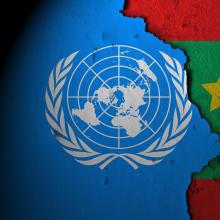May 01, 2023
Authorities in the United Arab Emirates (UAE) continue their sustained assault on human rights and freedoms, including targeting human rights activists, enacting repressive laws, and using the criminal justice system as a tool to eliminate the human rights movement. These policies have led to the closure of civic space, severe restrictions on freedom of expression, both online and offline, and the criminalisation of peaceful dissent.
For more than 10 years, UAE authorities have been unjustly detaining at least 60 Emirati human rights defenders, civil society activists, and political dissidents who were arrested in 2012 because of their demands for reform and democracy or their affiliation with the Reform and Social Guidance Association (al-Islah). Some from this group, commonly known as the "UAE 94" because of the number of defendants in their mass trial, were subjected to enforced disappearance, torture and other ill-treatment. They were sentenced to between 7 and 15 years in prison during a trial in 2013 that failed to meet minimum fair trial standards.
More than three-quarters of these prisoners have completed their sentences yet remain in arbitrary detention to date. UAE authorities refuse to release them, alleging that they continue to pose a "terrorist threat," based on vague laws that allow their indefinite detention, in flagrant violation of international human rights law.
The list of 60 detainees includes human rights defenders, activists, academics, lawyers, university professors, and royal family members, such as Dr. Mohammed Al-Roken, a leading human rights lawyer; Dr. Mohammed Al-Mansoori, a legal expert; Hadef Al-Owais, the dean of the Graduate School at UAE University; and Sheikh Sultan Al-Qasimi from the ruling family of Ras Al-Khaimah emirate.
By mid-2023, many of the detainees will have spent almost 11 years behind bars. Some have been denied family visits and communication with their families for up to five years.
Meanwhile, some of their families have been subjected to unrelenting reprisals. In some cases, the UAE authorities have arbitrarily revoked the citizenship of detainees and their families, depriving them of their rights as Emirati nationals and leaving them stateless. In other cases, the authorities have imposed travel bans on their family members, prevented them from studying or working, and have frozen their bank accounts. In November 2021, Muhammad Al-Nuaimi, the son of UAE94 defendant Ahmed Al-Nuaimi who has been living in self-imposed exile since 2012, passed away in the UAE. Muhammad had been placed under a travel ban in reprisal for his father’s activism, preventing him from being reunited with his parents and five siblings.
The UAE government has also unjustly imprisoned other Emiratis and foreigners over the past decade, such as the academic Dr. Nasser bin Ghaith; the prominent blogger and 2015 Martin Ennals Award winner Ahmed Mansoor; Abdulrahman Al-Nahhas, a Syrian; and Ahmed Al-Atoum, a Jordanian. Abdullah Al-Helou, whose prison sentence ended 6 years ago, and Abdulwahed Al-Badi, an engineer, whose sentence ended five years ago, are among those still in prison years after their sentences were completed.
In recent years, the UAE authorities have also issued a new Cybercrime Law (No. 34 of 2021) to restrict online activism and dissent and passed a law providing for the establishment of a National Munasaha Centre (No. 28 of 2019) with the alleged purpose of “counselling and rehabilitation of holders of terrorist, extremist or deviant thought”, broadening the scope of the 2014 anti-terrorism law which already allows for the indefinite detention of prisoners of conscience for “counselling” purposes.
As the UAE will host the 28th United Nations global climate talks (COP28) from 30 November to 12 December 2023, we express our deep concern over the human rights situation in the country, particularly the severe restrictions imposed by the authorities on the rights to freedom of expression and peaceful assembly, which seriously undermine the work of civil society and the space for political dissent in the country.
In addition, the UAE government could try to use its COP28 presidency to cynically promote an image of openness and tolerance, despite the UAE’s failure to respect the rights to freedom of expression, association, and peaceful assembly.
The UAE is one of the world’s largest oil producers, and funds from its vast fossil fuel industry provide the majority of the UAE’s government revenue. The Abu Dhabi National Oil Company, the UAE’s foremost fossil fuel company, recently announced it was expanding all aspects of its operations — despite a growing consensus that there cannot be new oil, gas, or coal development if governments are to meet global climate targets and protect human rights.
Civil society groups fear that the severe restrictions imposed by the UAE authorities in recent years will hinder the full and meaningful participation of journalists, activists, human rights defenders, civil society, youth groups, and indigenous peoples’ representatives at COP28.
Advancing climate justice and human rights requires a holistic approach to designing and implementing environmental policy, which includes addressing historically rooted social injustices, environmental destruction, the disproportionate effects of climate change on marginalized communities, severe abuses by businesses, corruption, impunity, and social and economic inequality. The most vital voices pushing back against these systemic problems in favour of meaningful and ambitious climate action have come from civil society.
Civil society actors will struggle to effectively play their role in pushing for ambitious action to address the climate crisis in a country whose government has such an abysmal human rights record. This is why the UAE, as the host country for COP28, is putting at risk any potentially positive outcome of the summit if it does not urgently stop its ongoing violations of human rights and lift restrictions on civic space.
The international community, including human rights organisations and UN human rights experts, has documented the ongoing violations by the UAE authorities since 2011.
Since 2013, the UAE has appeared in every annual report of the UN Secretary-General on intimidation and reprisals against those seeking to cooperate or having cooperated with the UN, demonstrating the continued harassment faced by human rights defenders in the UAE. The 2021 report describes “cases of arbitrary detentions, long prison sentences and the use of counter-terrorism legislation to target human rights defenders [in the UAE], including those facing reprisals for cooperation with the United Nations,” and criticises “law No. 7 on Combatting Terrorism Offences (2014), noting that its overly broad definitions of terrorist organisations might severely curtail the work of human rights defenders, including their ability to engage in international forums.”
In July 2022, the UN Committee against Torture, in its Concluding Observations following the review of the UAE, expressed “particular concern that reports received detail a pattern of torture and ill-treatment against human rights defenders and persons accused of offences against State security who, by virtue of the State security or terrorism charges against them, are subject to a legal regime with fewer and more restrictive procedural guarantees.”
In September 2022, the UN Working Group on Enforced or Involuntary Disappearances issued a general allegation on the pattern of enforced disappearances in the UAE, containing 12 questions to Emirati authorities. However, to date, they have failed to respond. Meanwhile, the UAE authorities continue to block UN experts from conducting in-country research and visiting prisons and detention facilities.
Recommendations:
1. Immediately and unconditionally release all those detained solely for the exercise of their human rights.
2. End all abuse and harassment of detained critics, human rights defenders, political opposition members, and their families.
3. Amend all repressive laws that violate human rights, including the Anti-Terrorism Law, the Penal Code, and the Cybercrime Law, and bring them into line with international human rights standards.
4. Close all secret detention centres.
5. End all restrictions on civil society organisations, and allow the establishment of entirely independent civil society institutions.
6. End restrictions on civic space and uphold the rights to freedom of expression, association, and peaceful assembly to enable meaningful participation of civil society and indigenous peoples at COP28.
7. Ensure an ambitious and human rights-consistent outcome of COP28, including through but not limited to the adoption of a call to all states to phase out all fossil fuels and all fossil fuels subsidies to meet the objectives of the Paris Agreement.
Signatories:
Access Now, Amnesty International, ALQST for Human Rights, Arab Organisation for Human Rights in the UK, Association for Freedom of Thought and Expression (AFTE), AVT-UAE, Center for International Policy, CIVICUS, Democracy for the Arab World Now (DAWN), Emirates Detainees Advocacy Centre (EDAC), Emirates Centre for Human Rights, Euro-Med Human Rights Monitor, Egyptian Human Rights Forum (EHRF), Egyptian Initiative for Personal Rights (EIPR), Front Line Defenders, Geneva Council for Rights and Liberties, Gulf Centre for Human Rights (GCHR), Global Witness, Grassroots Global Justice Alliance, Grassroots International, Human Rights Watch (HRW), Human Rights Solidarity/Geneva, IFEX, International Campaign for Freedom in the UAE (ICFUAE), International Centre for Justice and Human Rights (ICJHR), International Commission of Jurists (ICJ), International Service for Human Rights (ISHR), LAMU WOMEN ALLIANCE, MENA Rights Group, Migrants Workers Voice, No Peace Without Justice, Presente.org, Project on Middle East Democracy (POMED), Rights Realization Centre, Réseau des jeunes pour le développement communautaire, Salam for Democracy and Human Rights, Sierra Leone School Green Club, Skyline International for human rights, Stop Wapenhandel, The Freedom Initiative (FI), Women are Change Agents, World Organisation Against Torture (OMCT)







